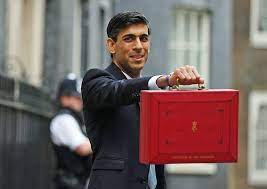HMRC umbrella company ‘checking tool’ looms for workers
Umbrella company consultation response and guidance due from HMRC, as more details come out on Tax Administration and...
READ MORE
More than £15 billion has been allocated to an unprecedented support package to help millions of households in the UK with cost-of-living pressures.

Almost all of the 8 million most vulnerable households across the UK will receive support of at least £1,200 this year, including a new one-off £650 cost-of-living payment.
Universal support increases to £400, as the October discount on energy bills is doubled and the requirement to repay it over five years is scrapped.
This new support package is targeted towards millions of low-income households and brings the total cost-of-living support to £37 billion this year.
New temporary Energy Profits Levy on oil and gas firms will raise around £5 billion over the next year to help with cost of living, with a new investment allowance to encourage firms to invest in oil and gas extraction in the UK.
The significant intervention includes a new, one-off £650 payment to more than 8 million low-income households on Universal Credit, Tax Credits, Pension Credit and legacy benefits, with separate one-off payments of £300 to pensioner households and £150 to individuals receiving disability benefits – groups who are most vulnerable to rising prices.
Chancellor Rishi Sunak also announced the energy bills discount due to come in from October is being doubled from £200 to £400, while the requirement to pay it back will be scrapped. This means households will receive a £400 discount on their energy bills from October.
Mr Sunak also announced a £500 million increase for the Household Support Fund, delivered by local authorities, extending it from October until March 2023. This brings the total Household Support Fund to £1.5 billion.
To help pay for the extra support – which takes the total direct government cost-of-living support to £37 billion – the Chancellor said a new temporary 25 per cent Energy Profits Levy would be introduced for oil and gas companies, reflecting their extraordinary profits. At the same time, in order to increase the incentive to invest the new levy will include a generous new 80 per cent investment allowance. This balanced approach allows the government to deliver support to families, while encouraging investment and growth.
Surging commodity prices have meant that the oil and gas sector is making extraordinary profits. Ministers have been clear that they want to see the sector reinvest these profits in oil and gas extraction in the UK.
In order both to fairly tax the extraordinary profits and encourage investment, the Chancellor announced a temporary new Energy Profits Levy with a generous investment allowance built-in.
The new levy will be charged on oil and gas company profits at a rate of 25 per cent and is expected to raise around £5 billion in its first 12 months, which will go towards easing the burden on families. It will be temporary, and if oil and gas prices return to historically more normal levels, will be phased out.
The new investment allowance, similar in style to the super-deduction, incentivises companies to invest through saving them 91p for every £1 they invest. This nearly doubles the tax relief available and means that more a company invests, the less tax they will pay.
The government expects the combination of the levy and the new investment allowance to lead to an overall increase in investment, and the Office for Budget Responsibility (OBR) will take account of this policy in their next forecast.
The levy does not apply to the electricity generation sector – where extraordinary profits are also being made due to the impact that rising gas prices have on the price paid for electricity in the UK market. As set out in the Energy Security Strategy the government is consulting with the power generation sector and investors to drive forward energy market reforms and ensure that the price paid for electricity is more reflective of the costs of production.
During the announcement, the Chancellor also set out the government’s strategy to control inflation through independent monetary policy, fiscal responsibility, and supply-side activism – a plan he said that should see inflation come down and return to its target over time.
Hannah Essex, co-executive director of the British Chambers of Commerce said the scale of the cost-of living crisis facing the British public means the government is absolutely right to provide additional support to those worst affected.
“For business, the toxic mix of inflation, raw material costs and supply chain disruption is the flip-side of the coin to the problems facing consumers,” she said.
“Unless steps are also taken to ease business costs, they will likely feed into the inflationary pressure on the economy and quickly eat into the financial support announced today.
“A reduction in VAT to 5 per cent on businesses’ energy bills would directly alleviate some of this pressure to raise prices.
“The Treasury must urgently consider the actions set out in our call for an Emergency Budget which would provide a way to break the inflationary cycle.
“If we can ease the pressure on businesses then they can keep a lid on the price rises. Firms will then have the breathing space they need to raise productivity and strengthen the economy.
“But a change of course is needed now. If the government does not act quickly then rising costs will put our economy in a stranglehold.”